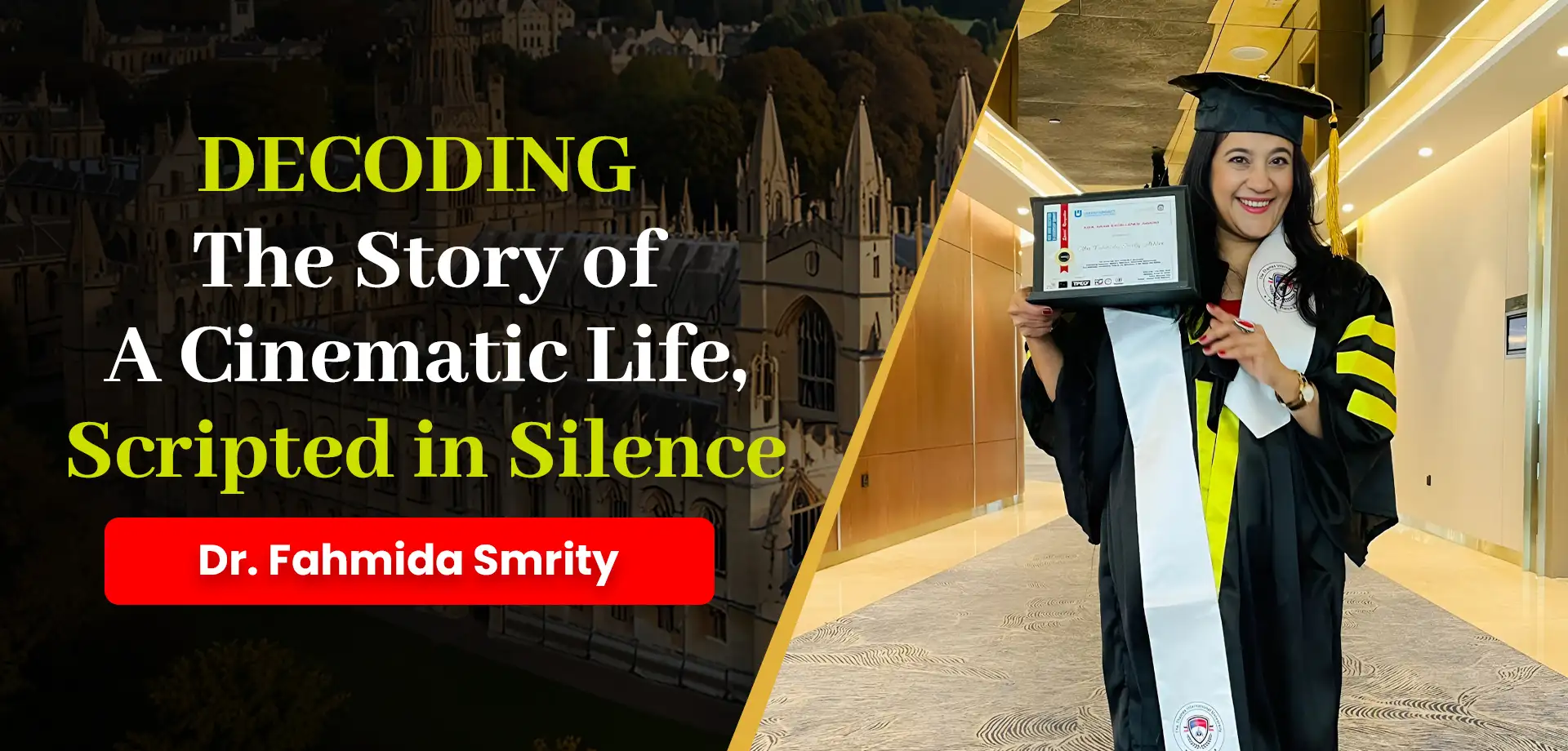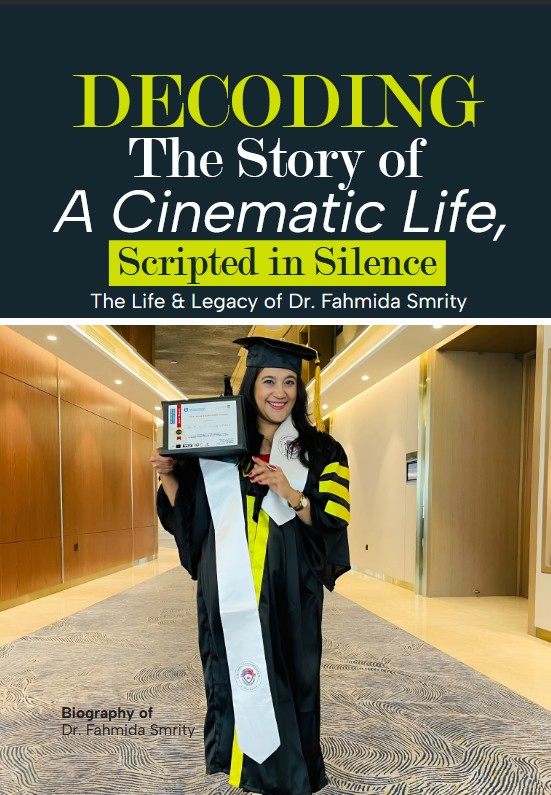

The two most important days in your life are the day you’re born and the day you find out why."
Introduction
Every once in a while, a life emerges that refuses to follow convention—one that carves its own path through art, intellect, struggle, and grace. Dr. Fahmida Smrity is such a life: richly faceted, fiercely original, and endlessly compelling. To define her within a single label—actress, academic, entrepreneur, mother—would be not only inadequate but unjust. She is not the sum of her titles; she is the architect of a rare synthesis where passion meets philosophy, and performance meets purpose.
Born in Bangladesh and shaped by both Eastern tradition and Western innovation, Dr. Fahmida Smrity’s journey defies the predictable arc. Her name is not only known across film sets and university halls but whispered in the quiet spaces where mentorship, motherhood, and meaning converge. What makes her story extraordinary is not merely what she has done—but how she has done it: with poetic precision, unshakable values, and the unwavering belief that one does not have to choose between being brilliant and being kind, between being maternal and being monumental.
She has acted for the world’s most acclaimed platforms, written books now housed in the British Library, taught students across continents, and built a beauty brand that embodies ethics and elegance. She has founded a film academy to shape storytellers of the future—and all the while, she has raised a daughter not in the shadows of sacrifice, but in the shared light of dreams fulfilled.
But this biography is not about chronology. It is about revelation. It is about what happens when a woman dares to live in full spectrum—where ambition is softened by empathy, where knowledge is sharpened by intuition, and where every triumph is measured not in applause, but in the lives quietly transformed along the way.
There is a reason her students remember her words long after the lesson ends. There is a reason audiences feel her characters long after the credits roll. There is a reason her products are chosen not just for their quality, but for the story they carry. And there is a reason why, when she speaks about legacy, she speaks not of her own—but of those yet to rise.
This is not a life that simply impresses—it moves. It stirs something dormant within the reader, the student, the seeker. It invites us not merely to admire, but to reimagine—what it means to lead, to create, to nurture, and to become.
Step into the story of Dr. Fahmida Smrity. It is not just a biography—it is a call to all who have ever questioned whether they are too much, too late, or too scattered. Her life whispers otherwise: that the world has always made room for those who arrive with depth, vision, and the courage to be whole.
Phase 1 : The Roots of Life
“I was raised in a home where silence was not emptiness—it was discipline, where books weren’t decorations—they were dialogue. My parents never pushed success onto me. They showed me that learning is not a task—it is a form of reverence. Every lesson I absorbed in that modest home built the architecture of who I would one day become. And I carry it, still.”
Dr. Fahmida Smrity, widely recognised across global and digital platforms as Dr. Smrity Fami, was born in October 1976 into a distinguished and intellectually rooted family in Bangladesh. She is the cherished daughter of Luthful Hossain and Sajeda Hossain, whose quiet strength and unwavering values would become the moral scaffolding of her life. From the very beginning, her upbringing was shaped not by privilege, but by principle—a home where education was not simply encouraged, but revered; where books were not decorations, but windows into deeper worlds; and where every act of discipline was balanced with dignity and compassion.
The pursuit of knowledge in her household was more than a cultural expectation—it was a daily rhythm. Conversations were enriched by insight, respect was earned through humility, and learning was treated not as a means to an end, but as a lifelong devotion. Her parents, particularly her mother Sajeda, instilled in her the belief that clarity of thought must always be matched by clarity of conscience. It was in this nurturing yet intellectually rigorous atmosphere that the early foundations of her luminous future were laid.
Even as a child, Dr. Smrity Fami was drawn not only to learning, but to meaning—to the layers beneath language, the silences behind gestures, the emotion within expression. These early sensibilities, combined with the moral clarity imbued in her by her family, would one day shape the artist, educator, and visionary the world now knows. Known today to thousands across social media and academic spaces as Dr. Smrity Fami, she has remained deeply grounded in the values instilled during those formative years—values that would become the quiet force behind her expansive and extraordinary journey.
From the very beginning, Dr. Fahmida Smrity was nurtured by the quiet strength and profound wisdom of her mother, Sajeda Hossain—a woman of deep emotional intelligence and unyielding resilience. Sajeda stood not only as a maternal figure but as a lodestar of grace, tenacity, and vision. Her silent sacrifices and unwavering commitment to her children’s future would leave an indelible imprint on her daughter’s soul. To this day, Dr. Fahmida Smrity regards her mother as the most formative influence of her life—a source of strength whose values continue to guide her in every professional and personal endeavour.
Equally instrumental in shaping her academic temperament was the example set by her brother, whose pursuit and attainment of a doctoral degree reinforced the family’s deep reverence for scholarship. In a household where intellectual curiosity was cultivated with care and academic discipline was considered sacred, it was only natural that Dr. Fahmida Smrity would come to view education not merely as a path to opportunity, but as a sacred duty and a powerful tool for transformation.
Phase 2 : Chronicle of the Great Learner
Before I learned to perform on screen, I learned to observe. To watch expressions that spoke more than words. To listen to the pauses between conversations. My education didn’t begin in classrooms. It began in the quiet dignity of my mother’s strength, in my father’s unspoken hopes, and in the pages of books that didn’t just teach—they transformed.”
For Dr. Fahmida Smrity, education has never been a mere pursuit—it has been an enduring devotion, a conscious act of growth woven into the very fabric of her identity. While her professional journey in film began as early as 1995, it was her unwavering desire to evolve intellectually and artistically that propelled her through an extraordinary academic path, marked by both brilliance and sacrifice.
In 2009, she earned her Bachelor of Arts in Film Studies from London South Bank University, laying the groundwork for her understanding of cinematic theory, cultural discourse, and the sociopolitical weight of film as a medium. Determined to enrich her creative discipline with practical expertise, she proceeded to complete a Bachelor of Fine Arts in Film and TV Production from the University of Greenwich in 2012, where she mastered the mechanics of screen production, narrative structure, and visual storytelling.
Her journey into postgraduate education was not just a continuation of academic exploration—it was a courageous ascent undertaken amidst one of the most transformative phases of her personal life: motherhood.
Dr. Fahmida Smrity enrolled at Anglia Ruskin University, where she completed her Master’s in Film and TV Production between 2019 and 2021. These were years of immense challenge—every lecture attended, every paper submitted, and every project completed was not just an academic task, but an act of quiet courage and perseverance.
She continued to deepen her scholarly commitment with a second master’s degree from Falmouth University (2023–2024) in Cinematography and Film/Video Production, demonstrating an unrelenting passion for the craft and an unshakable resolve to master its every nuance.
Today, Dr. Fahmida Smrity is a proud alumni of some of the most respected academic institutions in the United Kingdom and is honoured with a PhD in Film. Her doctoral journey is driven not only by a desire to contribute to global film theory but by a deeper, more personal calling—to serve as a role model for her daughter and for all women who dare to dream
To study and multitasking—it is to redefine strength. In Dr. Fahmida Smrity’s story, the pursuit of education becomes an act of love, a gift for her daughter, Rosalina Akther, and a bold declaration that motherhood and ambition can—and must—coexist. beyond convention.
Phase 3 : Elegance in Motion
“If there is no struggle, there is no progress.”
The acting and modelling journey of Dr. Fahmida Smrity stands as a compelling testament to artistic excellence, international recognition, and cultural transcendence. Her career, spanning decades, industries, and borders, is distinguished by a rare combination of aesthetic brilliance, narrative intuition, and adaptive range. From high-stakes commercial campaigns to thought-provoking cinematic roles, Dr. Fahmida Smrity has continuously redefined what it means to be a global South Asian artist in a rapidly evolving media landscape.
Her foray into the visual medium began with an intuitive understanding of the camera—an innate awareness of how movement, emotion, and silence could be woven into compelling visual language. Over time, this instinct matured into craft. She went on to model for 34 prominent brands, not as a mere face of consumerism, but as a storyteller, lending each brand narrative a distinct emotional identity. Among these collaborations, her iconic appearance in the International Coca-Cola campaign marked a defining milestone. The advertisement did not just showcase her charisma—it launched her into the global imagination, representing a blend of sophistication, authenticity, and mass appeal that resonated across cultural lines.
Dr. Fahmida Smrity’s appeal, however, was never limited to surface elegance. Her true mastery unfolded in the world of performance—on screen, under lights, and between the lines of character-driven scripts. Over the years, she had the rare honour of working under the directorial vision of some of the world’s most revered auteurs, including Shekhar Kapur, Rituparno Ghosh, Amitabh Reza, Louise Hooper, and Nicole Kassell. Each collaboration enriched her as an artist, challenging her to stretch the boundaries of genre, character, and form.
Whether in the nuanced complexity of independent cinema or the precision of large-scale productions, Dr. Fahmida Smrity brought a sense of gravitas and layered expression to every frame she inhabited. She navigated the emotional landscapes of her roles with an extraordinary ability to fuse intellect and intuition—an approach that became her signature style.
Her transition into the British film and television industry marked a bold new chapter, one that would expand both her artistic repertoire and her cultural influence. As an international performer, she became a visible force in projects produced by Netflix, BBC, Sky, and Amazon—platforms that reach millions across the globe. Her presence in these productions not only affirmed her versatility but also underscored her role as a cultural ambassador, subtly challenging the monolithic portrayal of South Asian characters in Western media.
In these roles, she was more than a performer—she became a bridge. A bridge between continents, between creative ideologies, and between communities that had long been underrepresented or misrepresented. Her commitment to authenticity, both in character portrayal and cultural representation, opened doors not only for herself but for a generation of South Asian talent navigating the complexities of Western media.